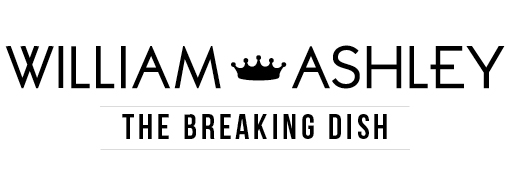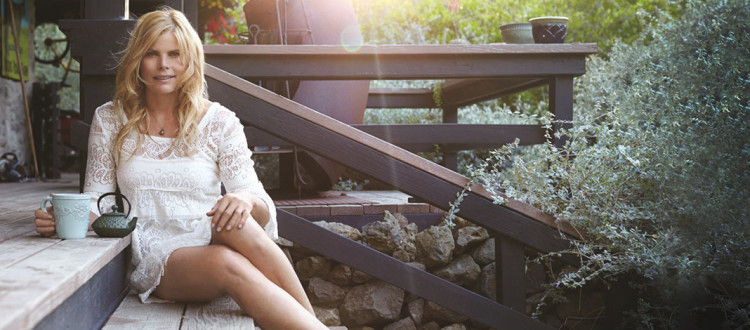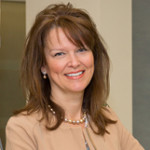Interview- Mariel Hemingway
 Sometimes there is only one degree of separation between an idea and the result. It was Julia Knight, designer of serve-ware and entertainment accessories, who introduced us to Cambria (quartz kitchen tops), suggesting that they would be a good fit for William Ashley. At the Cambria showroom we found out that the product was not only mined in Ontario but represented by Mariel Hemingway. The next step was inevitable. Here is an exclusive interview with Mariel Hemingway who dropped by to discuss her new book, ‘Out Came the Sun,’ and to speak to us about adopting a healthy lifestyle.
Sometimes there is only one degree of separation between an idea and the result. It was Julia Knight, designer of serve-ware and entertainment accessories, who introduced us to Cambria (quartz kitchen tops), suggesting that they would be a good fit for William Ashley. At the Cambria showroom we found out that the product was not only mined in Ontario but represented by Mariel Hemingway. The next step was inevitable. Here is an exclusive interview with Mariel Hemingway who dropped by to discuss her new book, ‘Out Came the Sun,’ and to speak to us about adopting a healthy lifestyle.
Let’s begin where everything begins, with Oprah. You spoke about ritual and mindfulness on Super Soul Sunday. Is having tea in the morning that profound?
Ritual can set the tone for the day. If you can do certain things with mindfulness it stretches time. Even if it is just five minutes (making tea or) washing dishes. Something in the brain happens where there is no panic. Chaos sort of settles when you are not doing.
Here is an illustration your daughter, Langley Fox, drew entitled, Reflections. In it, a woman wears imposing sunglasses that reflect the New York skyline. Your daughter is musing about you as Tracey in Manhattan. In your book , Out Came The Sun, you are reflecting on your family’s history. At William Ashley, mothers have been passing on traditions (for over sixty-five years), to their daughters (and sons). Are there traditions that you have passed on to your children at the table?
That’s so cool. (She looks at the illustration smiling). Thank you for this. Langley is a multi-talented artist. I was adamant to pass on better traditions. My family was quite bizarre. We were eating gourmet food on T.V. trays, watching Jeopardy and never speaking. So it was so important when I raised my girls that we sat down and had conversations.
In Out Came The Sun, you said that your mother wanted to gift you the family china. Did she and do you use it?
She did and we do. It’s Limoges and I have the whole thing. It’s so cool to have it because it is brought out only at Thanksgiving but that’s how we did it in our house. Those types of traditions, those rituals are incredible and I remember my mother trying to find the great place that repaired broken china, some of these things are lost today. We just break things and buy something new. Back then, it was a big deal to get things and take care of them. You wrapped (your china) in felt after the holidays and stored it away. Those are the type of traditions I wanted to pass on to my girls, some of that sense of history.
Can you describe a perfect dinner, real or imagined? What would it look like?
First, it would be on Cambria quartz, of course, darling. I like history so a pioneer flavor. I see lots of white, in a rustic barn. I would set a simple and elegant table with food of the region. I admire Alice Waters and her vision of eating local and organic but I think that is how we all should eat. There is nothing more beautiful than the colorful foods of summer on a simple setting.
We admire the fact that in your Emmy nominated documentary, Running From Crazy, you open your life to us, even the tough bits. How do you feel when you watch it?
I’m crazy! (she laughs) When I look at the footage, I think things like; I should have worn something better or why couldn’t I cry prettier? But, that was the point, to show a relationship with all the crazy shit that we go through and you know we go through it.
In your book, Out came the Sun, you talk about giggling in front of the Dalai Lama. What was that about?
All these people were asking huge questions and I really didn’t have anything to say, I was just happy to be in his presence. When it was almost over he put his hand on my shoulder, since we had been having this non-communication, communication. We were giggling. He looked right in my eyes and said, “you’re o.k.” You can take it as His Holiness knew that or you can take it as, “that’s right, I am o.k.” I think that it is important for everyone to come to the realization that you are o.k. and it is a powerful thought.
Thank you for championing the cause of mental health. It is often the elephant in the room. Do you have any suggestions for us as individuals or as a company to get involved?
If someone like me can bear all then let’s just be honest. In being honest about mental health, it is the first step to realizing that it is not that big a deal, or that there is help or… There are choices after there is acknowledgement. It is o.k. to speak about mental illness. It is important to have a conversation (at home and) at the workplace. It is the fear that we don’t speak that is the most horrific and has the worst outcome. If you show that you are accepting (individually), I think people then feel safe to be themselves.
You mention Canadians fondly in your book- people such as the actor John Candy and the director Philip Borsos. Your father was born here and your grandfather wrote for one of the most prestigious Canadian newspapers. Would you say that Canadians are more mindful than Americans?
I think that there is a more mindful aspect to Canadians. There are 34 million people in the whole country and there are 34 million people in California alone. I feel that Canadians are more aware of their surroundings and don’t take it as much for granted as the general American. I love Canada!
You quoted Audrey Lorde at the end of your book. “If I didn’t define myself for myself, I would be crunched into people’s fantasies for me and be eaten alive.” Did you know Audre Lorde when you were playing Christine in The Mean Season and why does this quote touch you?
No, I did not. (She giggles enthusiastically.) I think it is about choice and what that means is- I could have lived my life differently. I could have become a much bigger star. I could have slept with people. You know what I mean. But those choices were not a part of who I was and I chose to not be eaten up by the legacy I came from or the business that I was in. I chose to fight my way into finding myself. I chose an inner path and it was not often easy and I was, often times, deeply confused. There are still days when I wake up and ask- did I do this right? Now, I think that I’m going in a direction that makes sense for me. There was a time that I felt crunched, like my life was living me. I was in a marriage that I was unhappy with, it was nobody’s fault. I made the choice then that I was going to make it work. Of course, we all think the choices we make in life are right, when we are making them. I can look back on this quote (Audre Lorde) and know that it didn’t ultimately happen.
Interview by Sujeet Sennik









